Why a Loose Dental Implant Needs Quick Attention
If your dental implant ever feels loose, don’t ignore it — it’s your body’s way of saying something’s not quite right. Dental implants are meant to stay rock solid, just like a real tooth. When they move, even a little, it can mean the tiny screw inside has loosened, the gum around it is inflamed, or the bone holding it is starting to give way. A loose dental implant might not hurt yet, but that wobble is a warning sign that needs quick attention. Our Emergency Dentist Brisbane can check whether it’s just the crown on top that’s loose (easy fix) or the implant itself (more serious). The sooner it’s looked at, the better your chance of saving it — and avoiding bigger problems later.

How an Implant Is Put Together (So “Loose” Makes Sense)
Did you know a dental implant isn’t just one piece? It’s more like a small team working together:
- The main part, called the fixture, sits inside your jawbone and acts like a new tooth root.
- On top of that sits the abutment, a tiny connector that joins the implant to the visible part.
- Then there’s the crown — the tooth you see when you smile.
When something feels loose, it could be any one of these parts moving a little. That’s why it’s important to have a Dentist in Brisbane check which part is wobbling before it turns into a bigger problem.
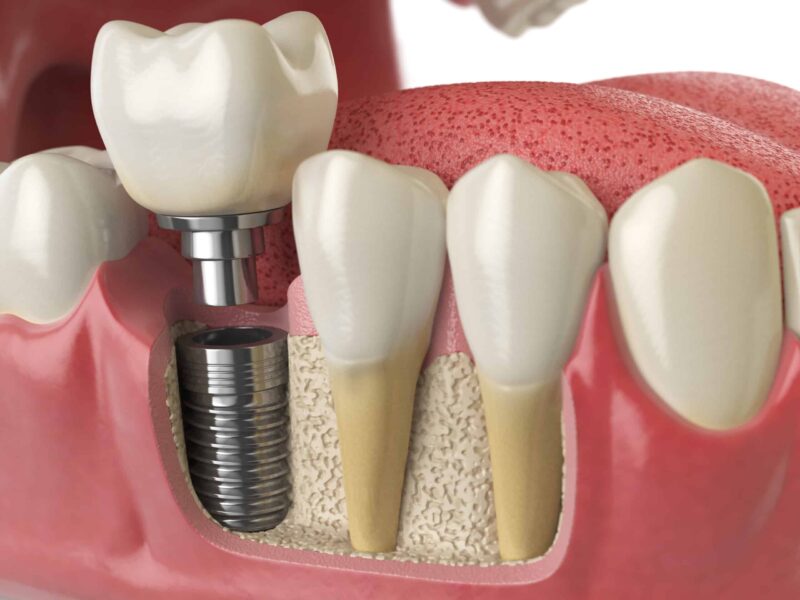
“Loose Crown” vs “Loose Implant”: How to Tell
When an implant starts to feel a bit wobbly, it doesn’t always mean the whole thing is failing — sometimes it’s just the top part that’s shifted. Think of it like a screw-on lid that’s come a little undone. Knowing whether the movement is from the crown on top or the implant underneath helps you understand how urgent it is and what your dentist might need to do next.
Signs It’s Likely the Crown or Abutment
If the tooth itself feels slightly off when you bite, makes a tiny clicking sound, or looks chipped, the problem might be with the crown or the small connector that holds it to the implant. You might even feel a bit of movement when you touch it with your tongue, but no soreness in the gum or jaw. This kind of issue is often mechanical and can usually be fixed quickly at the clinic.
Signs It May Be the Implant Fixture
If the gum around the implant feels tender, bleeds when brushing, or gives off a strange taste, it’s more serious. Movement at the gum line often means the implant post inside the bone has lost its grip or the bone around it is inflamed. It might not be painful at first, but this type of looseness needs prompt care to stop further bone loss or infection.
Why Only a Dentist Can Confirm with Exam and X-Ray
Even if you can tell something’s loose, it’s almost impossible to know which part without proper tools. Dentists use tiny instruments to test each section and X-rays to see what’s happening under the gum. What feels like a “loose tooth” to you could be a quick tightening job — or it could need deeper treatment.
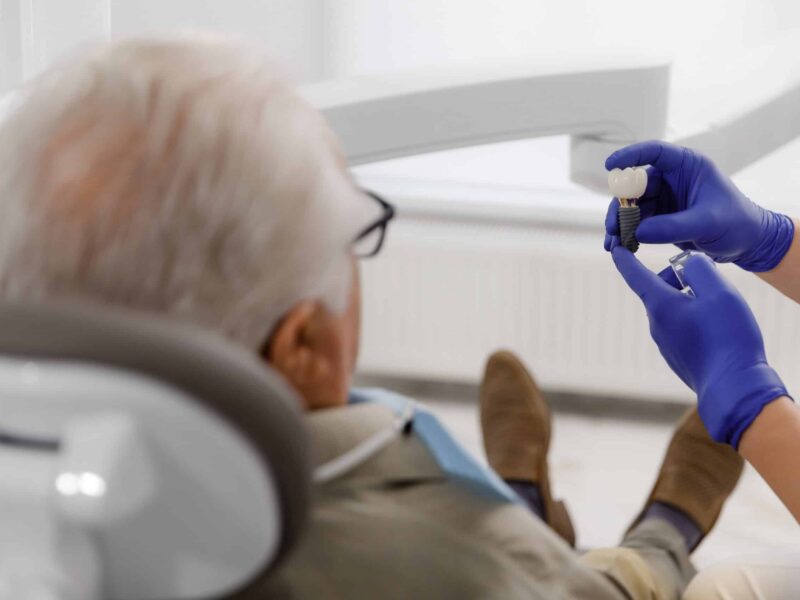
Common Reasons an Implant Feels Loose
There are a few different reasons why a dental implant might start to feel loose, and not all of them mean the implant has failed. Sometimes it’s a simple mechanical issue, other times it’s the gum or bone reacting to stress or infection.
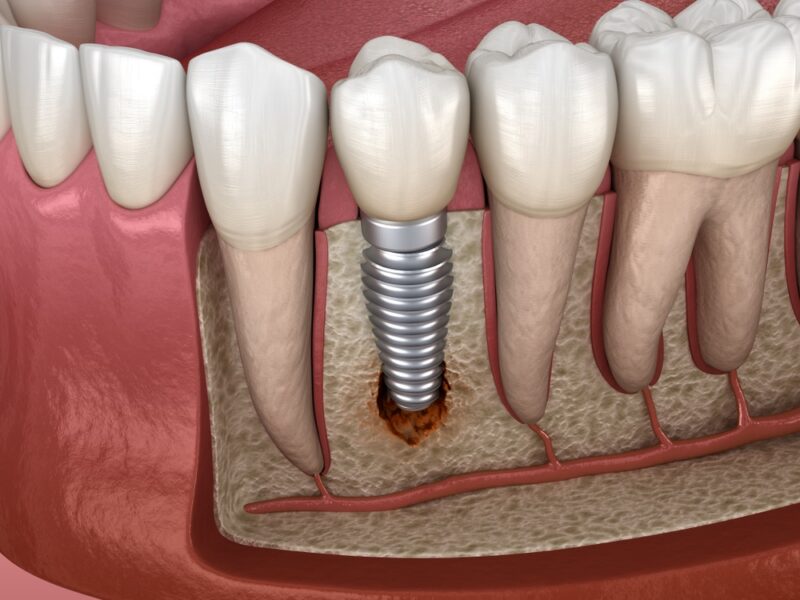
When to Seek Help Immediately for a Loose Dental Implant
Most of the time, a loose dental implant isn’t something you can or should “leave and hope it settles.” Some signs mean it’s time to call your dentist straight away — the sooner it’s checked, the easier it is to fix and the less damage it can cause. Here’s when you should treat it as urgent:
- Sudden movement after a hit to the face
- Pain, swelling, pus, bad taste, fever, or trouble swallowing
- Bleeding that won’t stop
- A crown that has come off, and you can’t keep it clean
If you notice any of these signs, contact your dentist the same day — a quick assessment helps prevent further damage and keeps the implant stable.
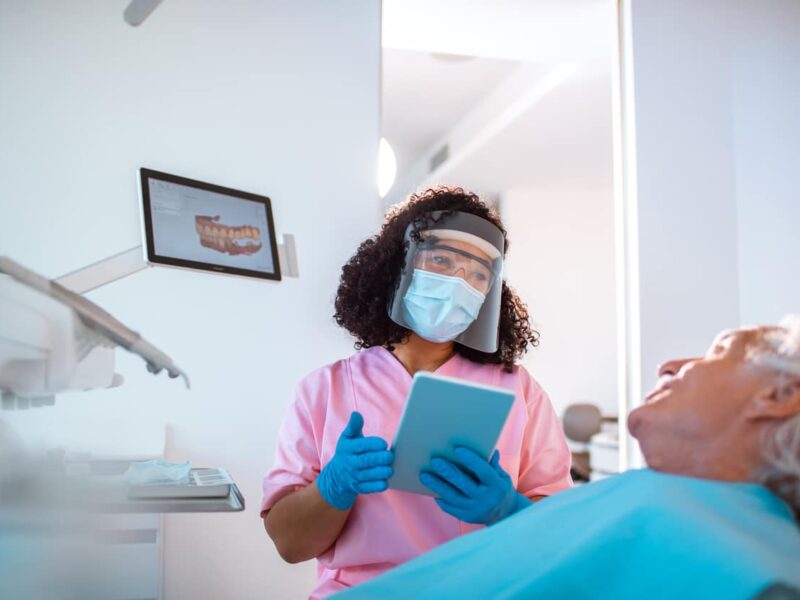
What We Will Do at the Visit for a Loose Dental Implant
If you come in with a loose dental implant, we won’t rush or guess — we’ll go step by step to find out exactly what’s moving and why. What matters most is catching the problem early, maintaining stability, and protecting your oral health. Here’s what usually happens during your visit:
Medical and Dental History Check (risk factors, medicines)
We’ll start by talking through your medical and dental background. Things like smoking, diabetes, recent medication changes, or gum problems can all affect how well an implant stays in place. This chat helps us understand what might be slowing down healing or putting extra pressure on the implant.
Clinical Exam and Mobility Testing for a Loose Dental Implant
Next, we gently check how much movement there is — and where it’s coming from. Sometimes it’s just the top crown wiggling, not the implant itself. We’ll also look for any redness, swelling, or signs of infection around the gum. This part of the visit is hands-on but painless.
X-rays to Assess Bone and Implant Parts
An X-ray gives us a clear picture beneath the surface. It shows whether the implant is still firmly connected to the bone or if there’s any sign of bone loss or inflammation. We can also see if the screw, abutment, or crown has shifted. It’s the most reliable way to confirm what’s really happening.
Bite Analysis to Look for Overload
Finally, we check how your teeth come together when you bite. If one side hits harder or if you grind at night, that extra force can slowly loosen an implant. Adjusting your bite — or making a custom night guard — can protect it from future stress. Once we know what’s causing the movement, we’ll explain your options and plan the next step with you.
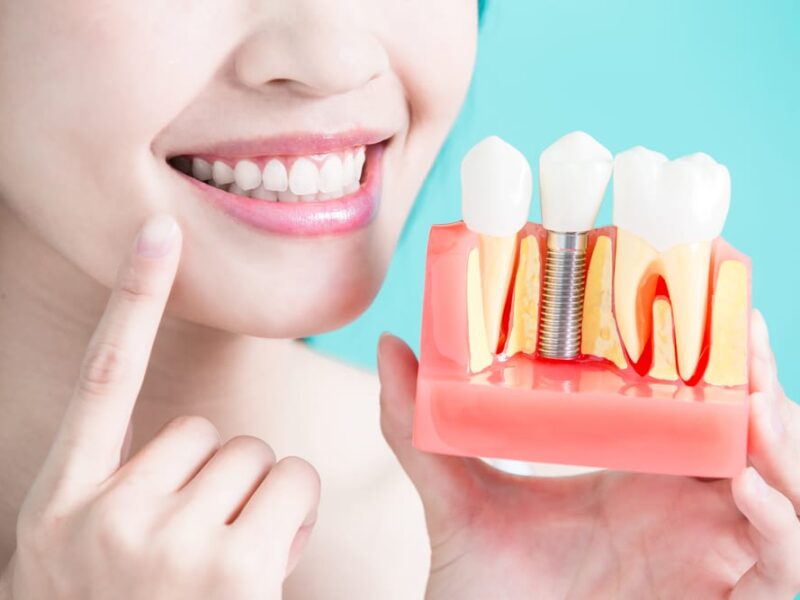
Treatment Options for a Loose Dental Implant
Once we’ve worked out why your implant feels loose, the next step is to treat the exact cause. Some problems are quick fixes that can be done in one visit, while others need a bit more time and care.
Here’s what treatment can look like depending on what’s causing the movement:
How to Prevent Implant Loosening
Dental implants are built to last, but they still need care — just like natural teeth. A few daily habits and regular check-ups go a long way in keeping them stable and strong. Here’s what helps most:
Daily Brushing and Interdental Cleaning around Implants
Plaque doesn’t care whether a tooth is natural or not — it will still build up. Brushing twice a day with a soft toothbrush and cleaning between the implant and nearby teeth with floss or interdental brushes keeps the gums healthy. Those tiny gaps are where bacteria love to hide, so keeping them clean protects both your implant and the bone holding it.
Regular Professional Maintenance and X-Rays
Even if everything feels fine, regular dental visits are essential. During your check-ups, we gently clean around the implant, remove any hardened plaque, and take X-rays every so often to check the bone underneath. These visits catch small problems before they become big ones — like early signs of bone loss or gum irritation that you might not feel yet.
Managing Gum Disease Risks
Gum disease is one of the main reasons implants loosen over time. Keeping your gums healthy means keeping the foundation of the implant strong. If you’ve ever had gum problems, we’ll show you how to clean more effectively and might recommend special rinses or more frequent visits to keep inflammation under control.
Night Guard for Grinding or Clenching
If you grind or clench your teeth, especially while you sleep, it puts extra stress on your implant. Over time, that constant pressure can loosen screws or wear down the bone around them. A custom night guard acts like a cushion, spreading the force evenly and protecting your implant while you rest.
Quit Smoking and Aim for Good Blood Sugar Control
Smoking and poorly controlled diabetes both slow down healing and reduce blood flow to the gums and bone. That makes it harder for your body to maintain a strong hold on the implant. Quitting smoking and keeping your blood sugar steady not only helps your implant last longer but also improves your overall oral and general health.
Sedation Options If You Have Dental Anxiety!
We’ve met plenty of people who put off dental care simply because the idea of treatment makes them tense up — sometimes it’s the sound, sometimes just the thought of being in the chair. If that sounds like you, there’s no judgment here. According to Brisbane Dental Sleep Clinic, sedation allows nervous patients to undergo complex dental procedures, such as dental implants, wisdom teeth removal, or root canal treatment, without added stress.
Laughing Gas (Nitrous Oxide)
Laughing gas is one of the gentlest and most common ways to relax during dental work, according to Dr Ellie Nadian, an experienced Brisbane Paediatric Dentist. You breathe it through a small mask over your nose, and within minutes you’ll feel lighter, calmer, and less aware of what’s happening around you. Once the gas is turned off, the effects wear off quickly, so you can usually go home on your own soon after.
IV Sedation
IV sedation is a deeper form of relaxation given through a small line in your arm. You’ll still be awake enough to respond to your dentist, but most people don’t remember much from the appointment. IV Sedation or twilight sedation is a good option for people with strong dental anxiety or for longer, more complex treatments like implant surgery. Because it takes a little time to wear off, you’ll need someone to drive you home.
Sleep Dentistry
For patients who have severe dental anxiety, need complex dental care, have special needs, or prefer to be completely asleep during treatment, Sleep Dentistry in Brisbane under general anaesthesia can make the whole process less stressful. You’ll be fully asleep and won’t feel or remember the procedure. Sleep Dentistry Brisbane is often used for people with extreme anxiety, medical or special needs, or major surgical procedures.
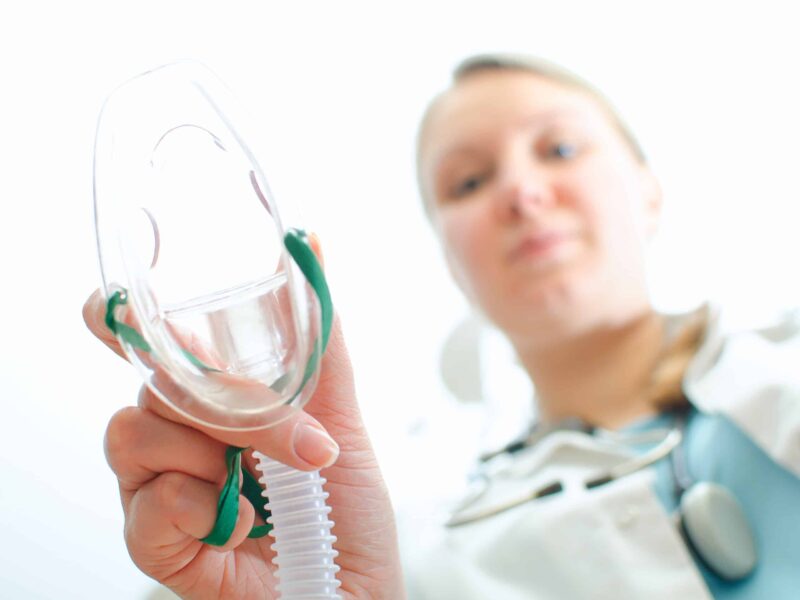
Medical Disclaimer
This article provides general information only. It does not replace advice from your own dentist or doctor. If you notice movement, pain, swelling, or signs of infection, book an emergency dental appointment.
Keep Your Implant Secure — Book a Check Today
If your dental implant feels even slightly loose, don’t wait for it to get worse — a quick check can save you a lot of trouble later. Call us on 07 3343 4869 to book your appointment.
Our clinic also provides tailored support for children with additional needs, ensuring each visit feels calm and supportive. You can learn more through:
1- Dental Care for Children with Special Needs
2- Dentistry for Children with Disabilities Brisbane
3- Dr Ellie Nadian, Brisbane Special Needs Dentist
📍 11/1932–1974 Logan Rd, Upper Mt Gravatt, QLD 4122